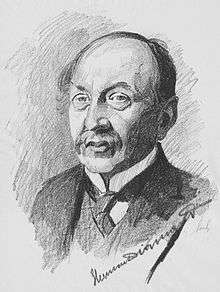Herman Diamand
| Herman Diamand | |
|---|---|
 | |
| Member of Parliament for the Second Sejm (1928-1930) | |
|
In office 4 March 1928 – 30 August 1930 | |
| President | Ignacy Mościcki |
| Personal details | |
| Born |
30 March 1860 Lviv, Poland (today Ukraine) |
| Died |
26 February 1931 Lviv, Poland (today Ukraine) |
| Nationality |
|
| Political party | Polish Socialist Party |
Herman Diamand (March 30, 1860 in Lviv – February 26, 1931 in Lviv) was a Polish lawyer and socialist politician, Member of the Imperial Council in Vienna, where he held XI and XII terms; during the Second Polish Republic he was a Member of Parliament of the Legislative, and for the first and second Sejm.
Biography
He was born in a middle-class family, the son of Jakub and Betty (née Holländrów).[1] He graduated in Lviv, then studied at the University of Vienna, Lviv and Chernivtsi and where in 1896 he obtained a doctorate. Already during his studies he joined the socialist movement as a co-founder of the Workers' Party of Galicia (October–November 1890). He sat in leadership until 1919 (since 1897 worked in the Polish Social Democratic Party of Galicia). Financially supported the party press and publications. From 1904 to 1931 he had represented the Polish socialists in the government. He shared the position with Ignacy Daszyński overlooking among others, the democratisation of Galicja relations, economic modernization of the country, independence and the assimilation of Jews. He supported the military-political activity of Józef Piłsudski. From 1907 to 1918, an envoy to the Vienna State Council. During the term he had gained notoriety and recognition as an expert in business and law. He was a member of the Sejm-Constitutional Provisional Council of State.[2]
In December 1918 was appointed to the Polish Liquidation Committee,[3] where he headed the department of mining. Strove French and English socialists to support the efforts regarding the Polish Silesia. He participated in the Polish delegation on trade negotiations with Germany (from 1924 to 1928) and the Geneva Naval Conference (1927). He was an active member of the Polish Socialist Party, being part of the leadership as a member of the Central Executive Committee (from 1919 to 1926) and member, Vice-President and Chairman of the Supreme Council (from 1919 to 1930).[4] He was considered an expert in parliamentary practice and economic and financial matters. He has published articles in Polish and foreign socialist press, including Naprzod,[5] "Rights of the People" Worker, "Arbeiterzeitung" and "Jüdische Volkstime".[6]